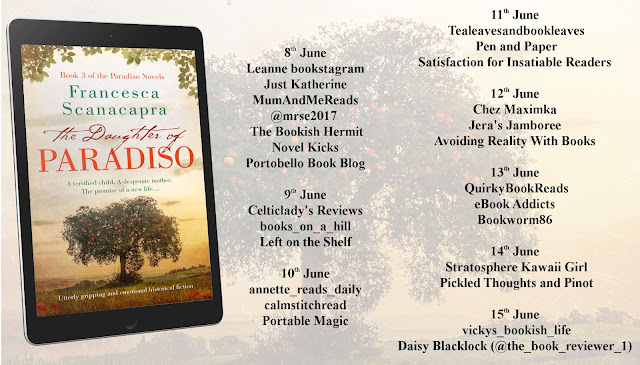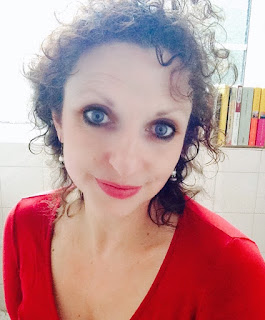"As we approached Paradiso, Lucia slowed and waited for me. I pulled up beside her. She turned to me and grinned, "I love it here, Mamma." Those were the most wonderful words my daughter could have said".
The Daughter of Paradiso by Francesca Scanacarpa is a moving and poignant historical novel, set in Italy, 1963.
This is the third book in the Paradiso series. It can be read as a standalone (I have read the first book and absolutely loved it, and still need to catch up on the second book).
Blurb:
Italy, 1963. Graziella Bianchi returns to Paradiso, barely able to believe she has been gifted her childhood home by an old friend.
The beautiful house has fallen into a state of disrepair, but Graziella is determined to restore it to its former glory.
Although one dream has come true, life is far from perfect. She and her daughter, Lucia, are nearly penniless and the pair are on the run from Graziella's violent husband.
With divorce not yet legal and the law still giving husbands ultimate control over their wives, Graziella must fight not only to gain her independence, but also to keep her daughter.
The villagers of Pieve Santa Clara, with their long and loyal memories, step in, and gradually a good life becomes a possibility for Graziella and Lucia.
But when her estranged husband turns up, drunk and angry, everything Graziella has worked so hard for is under threat.
Graziella Bianchi flees from her abusive husband to her childhood home in the village of Pieve Santa Clara. When she arrives to Paradiso, Graziella and her daughter Lucia believe it's the beginning of their new life.
The old house looks forlorn and neglected after being uninhabited for several years, yet the problems appear to be superficial and fixable. The house itself is an unexpected gift from Gianfrancesco Marchesini, Graziella's first love.
Her husband Gino is the epitome of the male-centred entitlement. He is a total waste of space.
While rebuilding her life in her old childhood home, Graziella is struggling. Money worries, endless house repairs, need to find a job, and there is always a threat that Gino will find them in Paradiso.
At the centre of this story is Paradiso. This old farm acquires a personality of its own, and becomes a living, breathing entity. It is a metaphor of love and hope, and a promise of stable life.
I loved all the descriptions of the old farms, the landscapes around the village, food cooked by the locals. The book's strength lies in the evocative portrayal of the old village, and everyday lives of the the villagers, with a cast of wonderful supporting characters, like Rita, a childhood friend and distant relative of Graziella, and Aurelia Grassi, the retired seamstress who loves her cat Alfonsina like her own child.
There is a colourful cast of secondary characters, who leave a lasting impression, like the Barcia sisters running the bakery, or the handsome and admirably progressive priest, Don Vincenzo, who cares for his parishioners and parish.
The elderly Pozzetti, Nonna Santina and Nonno Romolo, will hold a special place in the story. Their antique farm is described so vividly, you feel like you've visited it yourself, and sampled the delicious homemade wine brewed by Santina. The tale of how the Pozzetti couple got married is original, and moving. Told in simple words by Santina herself, it is an unsentimental tale.
Francesca is a master storyteller. Her book is a portrait of the social history of the early 1960s in Italy.
The village itself is a mixed entity. There is a sense of community, and most villagers accept Graziella back in their ranks and try to help her.
"These wonderful people were all my family, even those to whom I was not related by blood or marriage. I loved them all for the mayhem, joy and kindness they brought into my life and for how each of them, in their own unique way, was raising my daughter with me. Paradiso was not just where I belonged; it was where Lucia belonged too".
Yet far from everyone is understanding and supporting, there are enough people whose outlook is often quite parochial and judgmental as well. A woman who has left her husband, even if he is abusive, is judged according to the standards of the patriarchal society.
There are slow-moving changes observed in attitudes towards women, education, church. It is 1963, but the society is still very much patriarchal, where women are second class citizens. The institution of divorce in Italy was not introduced until 1970, while abortion became legal in 1978.
Some of the injustices of the system, punishing women for daring to claim some kind of freedom from men, will make your blood boil.
Women are not in control of their own bodies. Contraception is only allowed to married women, and only with the permission from their husband. Women's bodies belong to their husbands. A married woman is expected to have babies, whether she wants them or not. Abortion was a criminal offence, for which a woman could be impirsoned. A person helping her, as an accessory, ran an equal risk.
The scene of abortion is harrowing and heart-rending. A woman, putting her life in peril because she has no control. "How dismayed I was by the lack of control that we, as women, were afforded over our own biology".
The Daughter of Paradiso is a beautiful, thought-provoking read. First-rate historical fiction, rich in atmosphere and authentic characters.
This is the third book by Francesca that I've read, she is one of my top favourite authors. Her stories are always spellbinding.
Potential triggers: domestic violence/abuse, a scene of an abortion at home.
Many thanks to Francesca Scanacapra, Silvertail Books and Rachel's Random Resources for my copy of the book!
Purchase Links
https://mybook.to/DaughterofParadiso
https://www.amazon.co.uk/Daughter-Paradiso-Absolutely-beautiful-historical-ebook/dp/B0BWS6S5G6
Author Bio –
Francesca Scanacapra was born in Italy to an English mother and Italian father, and her childhood was spent living between England and Italy. Her adult life has been somewhat nomadic with periods spent living in Italy, England, France, Senegal and Spain. She describes herself as 'unconventional' and has pursued an eclectic mixture of career paths – from working in translation, the fitness industry, education and even several years as a builder. In 2021 she returned to her native country and back to her earliest roots to pursue her writing career full time. Francesca now resides permanently in rural Lombardy in the house built by her great-grandfather which was the inspiration for the Paradiso Novels. The Daughter of Paradiso is the third of the Paradiso Novels, following Paradiso and Return to Paradiso. The Lost Boy of Bologna, was also published by Silvertail Books.
Social Media Links –
Twitter https://twitter.com/FrancescaScana2
Insta @francescascana2




No comments:
Post a Comment